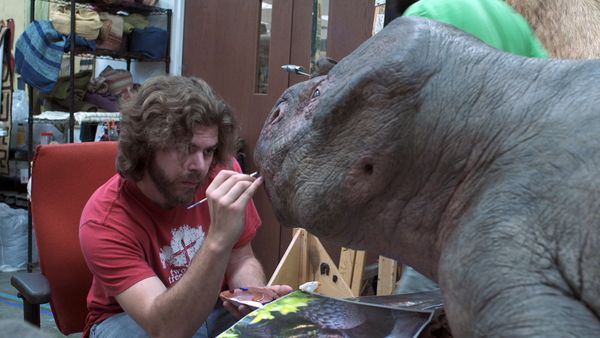Eye For Film >> Movies >> We Believe In Dinosaurs (2018) Film Review
We Believe In Dinosaurs
Reviewed by: Jennie Kermode

At 510 feet long, 85 feet wide and 51 feet high, the Ark Encounter, built on the outskirts of a small town in Kentucky, is built to precisely the dimensions specified in the Bible and is intended to promote Creationist ideas in an easily accessible, family-friendly way. But there are questions. Given the US' commitment to the separation of church and state, is it right that it should receive public funds? Is it ever really going to bring prosperity to the area as promised? Is it communicating a vital message that could save souls, is it a harmless eccentricity or is it a dangerous assault on reason and truth - and, perhaps, part of a much bigger problem?
Clayton Brown and Monica Long Ross' documentary explores these issues through interviews with those involved in the Ark project, those campaigning against it and local people who are just trying to do what's right for their town without getting drawn into lots of complicated political and theological arguments. There are many familiar stories here but also a few surprising ones, and there's a stark look at the difference between lore presented in scientific terms and back-to-basics scientific method.
To begin with, it's important to note that this isn't a film about a conflict between Christians and atheists. The Young Earth Creationists building the Ark are very clear that they don't consider anyone who fails to take the Bible literally - starting by believing that the Earth is just 6,000 years old - to be a true Christian, whilst many of those who question their stance feel that their belief in God in no way conflicts with their respect for science. Getting this out of the way enables the film to take a more nuanced approach to the issues and to look inside the Young Earth Creationist movement to present the thinking behind conclusions that can be difficult for outsiders to grasp.
Whatever one's beliefs, it's easy to be impressed by the hard work and ingenuity involved in the Ark. Like many US museums, it's a bit thin on actual old things but puts its focus on displays supposed to introduce young visitors to Bible stories. These have been created with painstaking reference to Biblical accounts, including efforts to work out what the ancestors of the whole variety of modern humans must have looked like, yet somehow Adam and Eve have still come out white. Careful, detailed work creating life-size models of some of the animals believed to have been taken on the ark produces some that look quite realistic, others that look like cuddly toys.
There's something similar going on with the beliefs behind it all. Some of the arguments used to justify them are very well constructed but others are just, well, fluffy. It would be unfair to assume that there are not other Young Earth Creationists who can do better, but whenever the interviewees here get into trouble they fall back on appeals to authority, be that "because the Bible says so" or the fact that somebody has a PhD (which, as a critic points out, means that they can do science, not that they do do science). It doesn't seem to take much to get them to this point - mercifully, nobody asks them to state the value of pi. Part of their success in appealing to children clearly stems from the fact that they use very simple arguments, which we see groups reciting by rote - but one gets the sense that, generationally, they have come to think no further themselves.
Despite all this, the film never comes across as mocking, letting all its participants speak for themselves and leaving the viewer to make sense of it all. It is in large part an ethnography, providing a glimpse inside a culture that gets relatively little exposure in media. Some will find it disturbing, especially with regard to the propaganda on display, but it deserves credit for making room for everyone involved to be seen as a human being, and the story of what actually happens once the Ark is opened is an interesting one, raising questions about the real motives behind its creation.
What really matters about this film, however, is the way it fits into the bigger societal conversation about truth, opinion and fact and how we manage these things in a democracy. Through the microcosm of the Ark story, Brown and Ross touch on much bigger things, bringing them down to a scale that's easier to grasp. in a key scene, Young Earth Creatonists tell one another that they shouldn't be talking about Bible stories because that makes them sound like fiction - instead thy should talk about Bible accounts or similar. This is a film about the value of stories and the way that, whether we believe them to be fact or fiction, they shape the way we understand the world.
Reviewed on: 26 Apr 2019














